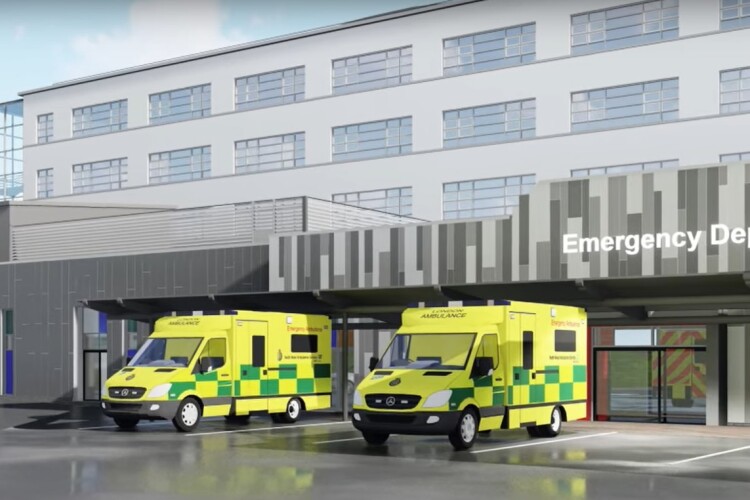At least seven of the 40 new hospital building projects promised by then prime minister Boris Johnson will not be completed by 2030, health secretary Steve Barclay has admitted.
The new programme prioritises the reconstruction of five hospitals that are most at risk from collapse due to crumbling concrete – specifically reinforced autoclaved aerated concrete (RAAC).
All new hospitals will be built using a standardised design known as Hospital 2.0, to cut costs by 25% and accelerate construction.
In a statement to the House of Commons yesterday, Barclay set out details of £20bn approved expenditure to 2030. These include five new hospitals added to the programme to be prioritised because of advanced RAAC deterioration. These are Airedale in West Yorkshire, Queen Elizabeth King’s Lynn in Norfolk, Hinchingbrooke in Cambridgeshire, Mid Cheshire Leighton in Cheshire and Frimley Park in Surrey.
Steve Barclay told the Houe of Commons: “We made our manifesto commitment in 2019, and in 2020 we listed 40 schemes as part of the new hospital programme. Since we formally launched the schemes, we have learned more about the use of reinforced autoclaved aerated concrete, more commonly known as RAAC. RAAC is a lightweight form of concrete that, between the mid-1950s and the mid-1980s, was commonly used in the construction of a number of public buildings, including hospitals—often on roofs and occasionally in walls and floors.
“We now know that RAAC has a limited lifespan, with difficult and dangerous consequences for the people who rely on or work in those hospitals. I know this has caused considerable concern to colleagues in this House, to NHS staff in those hospitals and to constituents who are treated in them.
“We remain committed to eradicating RAAC from the wider NHS estate. As part of the spending review allocation up to 2024-25, we allocated £685m in immediate support to the affected trusts, but in some cases we must go much further. Seven hospitals in England were constructed, either wholly or in major part, with RAAC, and an independent assessment shows they are not safe to operate beyond 2030. Two of the hospitals are already part of the new hospital programme, namely the West Suffolk Hospital and James Paget University Hospital. The five remaining hospitals have submitted expressions of interest to join the programme but are not yet part of it. Those are Airedale General Hospital in Keighley, Queen Elizabeth Hospital in King’s Lynn, Hinchingbrooke Hospital near Huntingdon, Mid Cheshire’s Leighton Hospital, and Frimley Park Hospital in Surrey.
“We accept in full the independent assessment that these hospitals are not safe to operate beyond 2030. Today, I confirm to the House that we will expand our new hospital programme to include those five further hospitals built with significant amounts of RAAC. With the two RAAC hospitals already in the programme, the seven RAAC hospitals will be rebuilt completely using a standardised design known as Hospital 2.0, with the aim of completing all seven by 2030. I can confirm to the House today that these new hospitals will be fully funded.”

However, while five projects are being brought forward, others are being pushed back.
Barclay continued: “Resolving the uncertainty over the RAAC hospitals, which today’s announcement achieves, in turn allows much-needed clarity for the rest of the new hospital programme. The programme has been divided into cohorts 1 to 4, and construction in cohort 1 has already started. Cohort 1 contains eight schemes. Two hospitals are already open to patients, with the new Louisa Martindale Building at the Royal Sussex County Hospital in Brighton due to open later this year. Work at Moorfields Eye Hospital is due to start imminently, having cleared its final business case.
“Cohort 2 comprises 10 schemes. The following schemes will now be ready to proceed, in line with plans set out by the respective trusts: the National Rehabilitation Centre; Derriford emergency care hospital in Plymouth; Cambridge Cancer Research Hospital; Dorset County Hospital in Dorchester; and St Ann’s Hospital, Christchurch Hospital, the Royal Bournemouth Hospital and Poole Hospital, all of which are in Dorset.
“A further two schemes within cohort 2, Shotley Bridge Community Hospital and the women and children’s hospital in Cornwall, will also be approved to proceed, but in line with the standardised design elements we are promoting through Hospital 2.0, on which I will set out further details in a moment. As such, with the uncertainty that surrounded the RAAC hospitals now addressed, all the cohort 2 schemes can proceed, and they will be fully funded.
“The cohort 3 schemes include major hospital new builds at Sutton, Whipps Cross, Hillingdon, Watford, Harlow, Leeds and Leicester. Today’s announcement confirms that those schemes will now proceed and be fully funded. They will be constructed using the Hospital 2.0 standardised approach. It is worth reminding the House of the merits of using that methodology. First, although longer will be taken on the initial design, the current approach of each scheme constructing its own bespoke design has meant that the average time from design to completion of a major hospital has been about 11 and a half years.
“Turning to the hospitals in cohort 4, two of the schemes —West Suffolk Hospital and James Paget University Hospital—are RAAC hospitals. As I touched on a moment ago, they have been confirmed as part of the seven RAAC schemes. They will therefore be funded for completion by 2030. Four more hospitals in cohort 4 remain on track for completion by 2030: Milton Keynes University Hospital, Kettering General Hospital, Musgrove Park Hospital in Taunton and Torbay Hospital.
“The remaining seven hospitals within that cohort will also proceed as part of the new hospital programme. The work will start on those schemes over the next two years, but they will be part of a rolling programme where not all work will be completed by 2030. That is a reflection of the disruption that two years of the covid pandemic caused, as well as the pressure from construction inflation.
Shadow health secretary Wes Streeting was not impressed. “Across England, backlog maintenance costs have more than doubled, from £4.7bn in 2011-12 to £10.2bn in 2021-22,” he said. “King’s Lynn has earned itself a special accolade – the most propped hospital in the country. More than 4,000 steel and timber support props are supporting its dilapidated roof – enough to extend for six miles. We have leaking sewage, rat infestations and collapsing roofs. We are in this mess because of Conservative neglect and mismanagement. They literally did not fix the roof while the sun was shining.”
Got a story? Email news@theconstructionindex.co.uk



